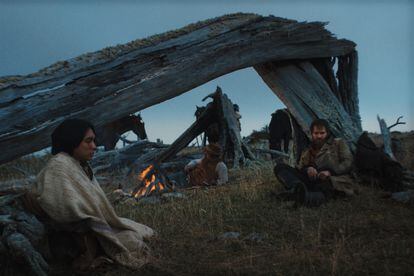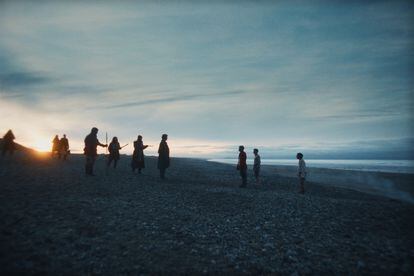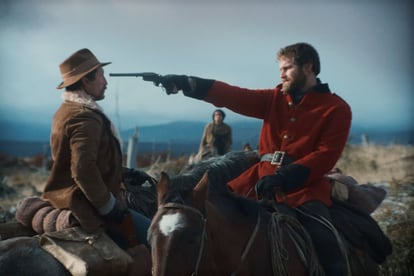The thought was planted in Felipe Gálvez’s head 12 years in the past. He tried to think about different topics, however none of them compelled him like this one. It could be a interval movie, his debut characteristic, and he would shoot it in Tierra del Fuego. He discovered concerning the historical past that may encourage the movie from an impartial newspaper, and was struck by the truth that he had by no means studied the occasions at school — that it was not a part of the nation’s official historical past. He skilled a sort of déjà vu: it reminded him of sure different historic moments that Chile “tries to not discuss” and “avoids revisiting.” “I discovered it placing that the genocide of the Selk’nam was so hidden,” says the 41-year-old director and screenwriter from Santiago, Chile.
That early concept and curiosity planted the seed for what would ultimately turn into Los colonos (The Settlers, in its English launch), Felipe Gálvez’s first movie, which, forward of its business debut in Chile, has made an intensive tour of festivals, together with the distinguished Cannes Movie Competition, the place it received the Worldwide Federation of Movie Critics Award for Greatest Movie. The movie is about within the late nineteenth century, as sheep ranches cropped up throughout Patagonia. In 1893, a multiracial Chilean mestizo named Segundo, an English soldier named Maclenan, and an American mercenary named Invoice set out on a horseback expedition to delimit and lay declare to the lands that the state has granted to Spanish businessman José Menéndez. What at first seems to be an administrative expedition turns right into a violent hunt for the Selk’nam — often known as the Ona or Onawo — the indigenous inhabitants of the Tierra del Fuego archipelago.

“I assumed it will be fascinating to take a look at a lesser-known second in historical past — a time when there was additionally lots of violence, which might transfer us to mirror on the current,” Gálvez says, talking to EL PAÍS from his house in France. “I strategy the Selk’nam genocide from the viewpoint of white settlers, from the viewpoint of those that dedicated the violence and offenses, to mirror on issues that, for me, are occurring within the current. It’s a mirrored image on issues within the current and the historical past of my nation 100 years in the past, 50 years in the past, and what can occur with any historical past that continues to be unwritten.”
Gálvez says that the script took him about 4 years to complete. A lot of the data he drew on to inform the story got here from paperwork and analysis that started to emerge solely 15 to twenty years in the past, regarding occasions that passed off within the mid-1800s, which is when invasion and colonization started within the area. The movie was based mostly on ethnographic data from journey accounts, research and paperwork that debate the Selk’nam and the way they lived as a individuals, however primarily on information from the primary decide despatched by Chile to research crimes dedicated in Tierra del Fuego. The investigations of the federal government emissary, who, throughout his keep, lived on the home of Spanish businessman José Menéndez, thought of the “King of Patagonia” as a result of he made one of many largest fortunes within the area and managed giant swaths of land in Chile and Argentina — Menéndez is performed by Alfredo Castro within the movie — resulted within the publication of the Sumario sobre vejámenes inferidos a indíjenas de Tierra del Fuego (“Abstract of the abuses inflicted on the indigenous inhabitants of Tierra del Fuego”).
The doc incorporates interviews performed with ranchers, police chiefs and foremen who testify about what occurred. “All over the place within the Americas has its José Menéndez, its foreman, its mestizos — characters one depends to interpret the historical past of our continent, and that we relied on to create a narrative that works by itself, whether or not you understand the historical past of Chile or not. I consider that individuals who have been colonized and the nations which have been colonizers will acknowledge themselves within the movie, which isn’t supposed to be a historic doc. My goal was to create a mirrored image, utilizing cinema — to make a common movie — about, because the title says, the settlers, the colonizers, and once they result in processes of colonization.”

Gálvez supposed for the movie’s cinematographic expertise to be a “visceral” one, during which the spectator may really feel that she or he has joined the characters on their journey, changing into an confederate to the occasions. For that reason, the massive landscapes, the ambient and atmospheric sound, in addition to the pictures, have been conceived, he explains, to be skilled within the theater. Following this identical logic, Gálvez and his co-screenwriter Antonia Girardi considered the movie in sections or chapters. The primary half was conceived as a Western, with adventures on horseback and graphic violence. The second, as extra of a drama and political thriller, which takes place indoors, however with scenes the place what is alleged is “extraordinarily violent” in its personal proper.
“The 2 constructions of the movie undergo completely different layers and varieties of violence. One is open air and is executed bodily. The opposite, indoors, in an armchair the place it’s executed silently and with phrases. For me, the movie could be very cinephile, and because it transforms and captures the viewer, it permits you to perceive the methods cinema makes use of to govern you, as a result of the movie additionally tries to mirror on cinema as a machine that itself is a part of the rewriting of Twentieth-century historical past,” he says.

This, Gálvez says, persevering with on the theme of Westerns, is a software and an invention of cinema to painting the Americas as a civilized continent. The style addresses abuses and massacres, however transforms the cowboy, the white man, into the hero, whereas containing the indigenous, the uncivilized, to the previous. For that reason, he says, George Orwell’s well-known quip that “historical past is written by the winners” additionally applies to cinema. “The movie tries to mirror on who these winners are which have written historical past. What are they hiding, what’s the historic counter-narrative, and why do the winners not wish to acknowledge it,” he provides.
The Settlers premiered in Chile on January 18, whereas in Mexico, Colombia, Ecuador, Bolivia and Peru, the date is about for January 25. In Argentina and Uruguay will probably be accessible from February 1 and eventually on February 8 in Costa Rica, Guatemala, Honduras, El Salvador, Dominican Republic and Nicaragua. Gálvez is trying ahead to the premiere of the movie in Chile, and hopes will probably be obtained, not as a “crude provocation,” however fairly to generate a dialog and to expertise occasions from a unique viewpoint.
“I feel the response goes to be fascinating, as a result of to start with, while you make movies, you usually attempt to embrace on the agenda a difficulty that isn’t a part of the agenda. There will probably be individuals who share the imaginative and prescient, and individuals who received’t. What pursuits me is to impress a dialog, like making little ripples within the water to generate a wave that makes some small influence. The movie isn’t propaganda, it’s fiction, and above all, is impressed by cinematic concepts and hopefully leaves the viewer desirous about lots different issues as properly,” he concludes.
Join our weekly publication to get extra English-language information protection from EL PAÍS USA Version

/cloudfront-eu-central-1.images.arcpublishing.com/prisa/664FIRN62NBO5HCM7SD5HWSV2Y.jpg)